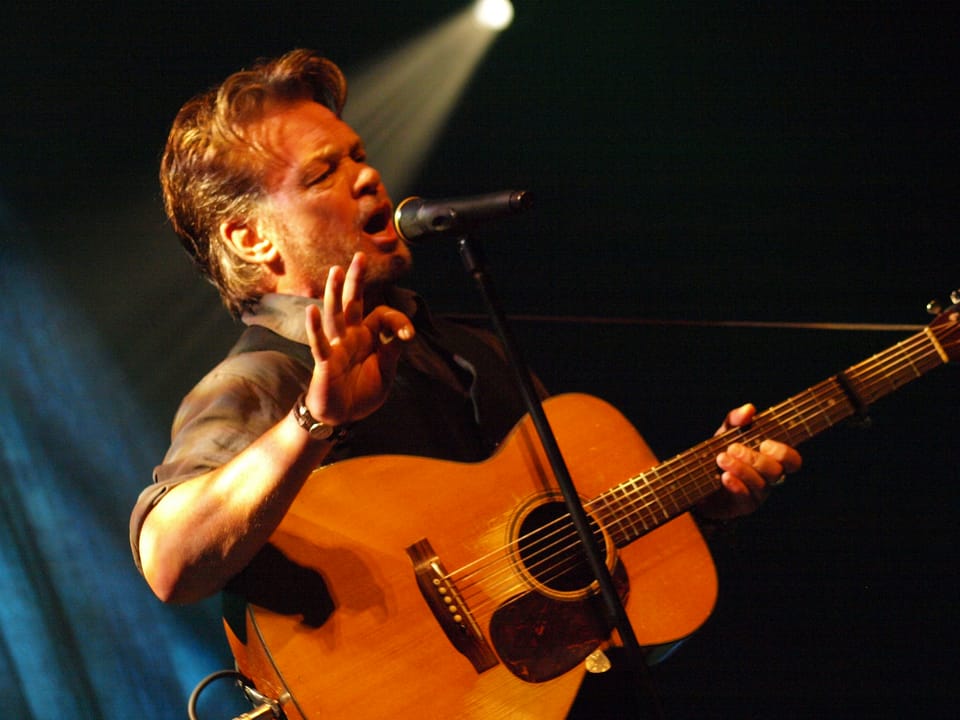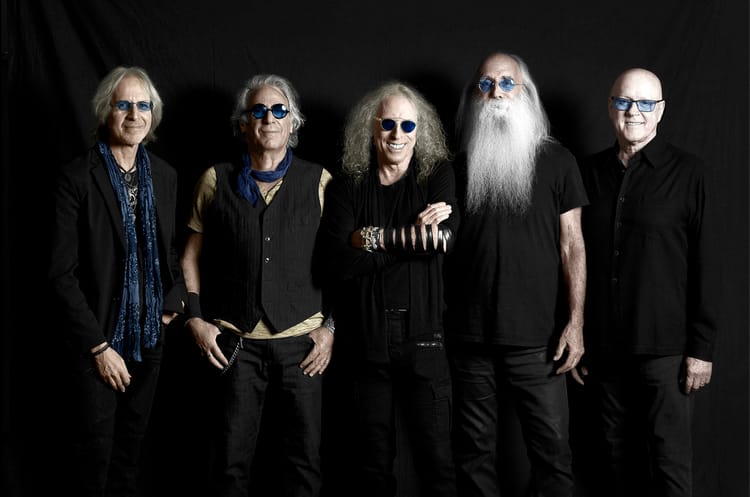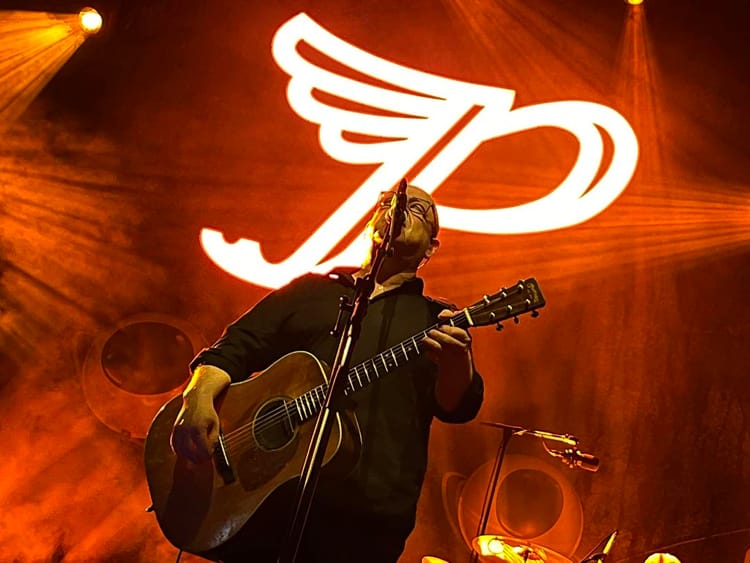John Cougar Mellencamp was right: audiences are ruining concerts

Let's all be straight with each other.
If you're the sort of person who occasionally attends public film screenings or concerts, you’ve seen this coming for a long time. I certainly have, and I can't be alone.
The downward slide began in the early 1970s when the merging of technology and greed first allowed concerts by superstar musical acts to reliably and repeatedly transition from the smaller confines of theaters left over from the golden age of vaudeville and motion pictures and municipal civic auditoriums more acoustically appropriate for trade shows or beauty pageants to sports arenas, stadiums, and colosseums.
Colosseums.
You know, the places originally designed and intended for Grand Guignol spectacles, such as the staged hunting of wild animals held in captivity and public human executions.
I'm speaking of the slow death of the long-established rules of etiquette for those attending public concerts, readings, plays, discussions, film screenings, and artistic exhibitions of any kind. Those generally accepted principles of civilized behavior have been declining for a half-century. Still, it's only in the past five years or so that this demoralizing, infuriating rot has become something of a juggernaut that increasingly threatens the very social contract that exists between creators and performers and their audiences and which allows for broad swaths of the entertainment and cultural arts industries not merely to thrive, but to exist in a form which we’ve all taken for granted.
Hyperbole, much? Nah.
Twenty-four hours a day, you can feel it, and you can hear it.
Never more clearly and loudly than at a concert hall or a theater — rooms that used to serve as sacred spaces filled with a communal sense of respect and awe and which now, more often than not, seemingly serve as unofficial annexes of every braying jackass’ rumpus room.
Gone are the days before cell phones, the 24-hour news cycle, rampant overprescription of ADHD drugs, and the compression of Warhol's 15 minutes down to a mere 20 seconds or so. I long for the era when being lucky enough to catch a live show by an artist you admired was seen as an essential event to focus on with extreme diligence and to savor.
Perhaps you do as well?
It's increasingly difficult for those old enough to recall what life was like then to believe those recollections are real, not some implanted societal memory. The Mandela Effect, indeed.
How many times over the past two decades have you found yourself filled with rage directed at audience members whose pathetically self-important and immature behavior ruins your enjoyment of the event? How many times have you left a show you'd waited months or years for the chance to attend —and perhaps spent your last bottom dollar on for that very opportunity — only to realize before you'd even exited the building that your disappointment clouded your memory of the experience so much that it had left you with a deep sense of betrayal at the way those around you behaved?
Guilt by association. It's the worst. I’ll take properly placed guilt for my actions any day, and that's a horrible feeling.
Now, don't get me wrong. I fully comprehend that certain types of shows are designed for audience participation or, at the very least, conceived of with eyes wide open to the fact there's at least a decent chance such behavior may occur. It's factored into the equation by the artists, the performers, the filmmakers, and the fans. Creative intent can turn such educated assumptions into an asset for the finished product. Those needing proof of this should take 94 minutes out of their life to watch Shock Treatment, 1981's ill-fated but unfairly vilified follow-up to 1975's rock stage opera-turned-international cult cinema classic of psycho-sexual catharsis The Rocky Horror Picture Show.
However, one size does not fit all regarding the proper etiquette for audience members witnessing publicly performed or projected art in its myriad forms.
Now we come to the origin of this essay: the supposed impudence of noted Americana singer-songwriter John Mellencamp.
It would appear that two nights ago on March 17, during the intimate, solo, acoustic portion of his concert in Toledo, Ohio, Mellencamp had —depending on who's typing— a meltdown, a breakdown, or a hissy fit. Purportedly, he acted in an unprofessional and irrational manner, verbally abusing his fans and robbing them of their God-given right to see him perform an entire show's worth of the type of exemplary, contemplative, literate, and highly poetic compositions he's known for.
Like this:
This song and video are straight-up harder for me to deal with than Curb Your Enthusiasm.
According to some, he threw a childish tantrum and ended his show halfway through, cursing and storming off stage, leaving the near-packed house at the 2,400-seat Stranahan Theater unfulfilled, insulted, and ripped off.
However, things are not always as they seem.
Not too long ago, there was a time when the opportunity to sit and see an acclaimed troubadour onstage alone in a hall designed explicitly for hushed performances was considered a momentous occasion. Indeed, it would be regarded worthy of a crowd's sustained, polite, if not rapt, attention. Wouldn't it stand to reason that the vast majority of folks willing to spend a significant amount of money to attend would care enough for the artist to show them a modicum of kindness and deference?
I think back to 1966, when Mellencamp's friend and songwriting hero Bob Dylan played a series of seated theater shows –quite similar to Mellencamp's current tour– throughout Europe and the United Kingdom, just before the release of his landmark double album Blonde on Blonde. Dylan split those shows into two segments: one found him alone on stage with an acoustic guitar and harmonica, and in the other, a complete electric band backed him up – again, just as on Mellencamp's current outing.
That legendary run of dates is well known for the uniformly loud, obnoxious, and antagonistic behavior of the sold-out crowds. The U.K. audiences, unhappy with the increasingly rambunctious direction of Dylan's latest music, displayed an especially vitriolic and arrogant attitude towards him. Angry booing, catcalling, and heckling happened every night. Dylan became increasingly grumpy and openly, vocally combative. By the end of the tour, Dylan was mocking some of the audiences and demanding his backing musicians "play fucking loud" to drown out the distracting and demeaning interaction from his "followers."
Here's the long-belated officially released recording of that moment, dripping with sneering proto-punk disdain (which was not even remotely common at rock shows until that point):
If you think you've heard this song a million times, but you've never heard -- or especially SEEN -- this particular performance, you owe it to yourself to do so, as it is otherworldly, and we're very lucky this footage and this recording were captured for posterity.
This unprecedented tense back-and-forth dialog between a pop artist and his supporters was immortalized on illegal, unauthorized recordings released and distributed clandestinely from the late 1960s onward to his hardcore devotees. Those awkward, hostile interactions came in many ways to define Dylan's still-ongoing prickly relationship with his own fervent, possessive fanbase.
However, one key aspect of that tour, which often eclipses its famously hostile moments, is that the solo acoustic portion of these shows prominently showcased new, densely-layered compositions that had yet to be released commercially. Thus, almost half the running time of each of those nightly solo segments comprised material unknown to literally everyone in attendance. They were all hearing them for the very first time together.
These days, when most established, legacy artists perform their latest songs, let alone new and unheard material, many in the crowd see that as their cue to head for the restroom or concession stand. However, in 1966, during the unveiling of these tunes, the halls were eerily whisper-quiet. In fact, on the various audience recordings of that run of shows, one cannot even make out a whisper from the crowds. What you can hear, however, is the sound of polite, attentive, and laser-focused fans hanging on every note and syllable coming from the stage.
In other words, silence.
The contrast between the two halves of those shows is jaw-dropping.
Here's a recording of one such mesmerizing example of audience non-participation during a completely unknown piece of music:
Seriously, can you possibly imagine attending a sold-out show by an international superstar alongside 5,200 other fans at any point in the past 25 years that's this quiet and attentive?
While it's true that a good bit of the resentment that these audiences felt toward Dylan was rooted in their dislike for what they perceived as his temerity in augmenting previously sparse, primarily acoustic compositions with a full complement of electric guitars, drums, piano, and organ, there's more to it than that. Back then, folks cared more about how they behaved in public. And, they had been brought up to recognize, understand, and —most importantly— respect the extreme power they wielded, both alone and together, in the implicit contract between stage performers and their audiences.
The image of a lone minstrel, figuratively naked on a brightly lit stage in a darkened hall, surrounded by strangers, striving for their attention and acceptance, is one of the most powerful that exists. That image and that symbolic —and symbiotic— relationship can and has moved mountains, won rights for the disenfranchised, and fundamentally changed the course of human history.
Does that mean I equate Mellencamp's show two nights ago in Toledo with the Rev. Dr. Martin Luther King, Jr.'s March on Washington speech? No, of course not.
But it does mean that some things in this world deserve a modicum of respect for the inherent difficulty of the task at hand, such as sharing a sincere, personal moment by oneself on stage in front of thousands of people. As the singer was doing when he was so rudely interrupted this past Sunday.
The audience-shot video of the incident tells the tale. And from where I sit, as both an ardent live music fan and someone who's had the occasion countless times over the past 36 years or so to be on stages in front of crowds of all types, there was no "meltdown" or "tantrum" or abdication of any responsibility to the audience. There was just an honest, candid, human reaction to workplace stress — albeit the kind of reaction that most song-and-dance-men are reluctant to display in front of the folks who pay their bills and prop up their Jenga-like egos.
It's worth noting that while Mellencamp did, in fact, abruptly end his show after being loudly and rudely interrupted by an impertinent and self-absorbed concertgoer, he restarted the show a while later, ultimately completing a truncated version of his usual set. Many people in the crowd —either because they took him at face value when he initially claimed to be done or because they took umbrage at what they perceived to be entitled behavior on his part— missed his return because they left almost immediately after he walked off stage.
It's also worth noting that the songwriter has in the past been publicly vocal about just how annoying he finds it when audience members scream stuff at him while he is trying his darndest to perform stark, quiet, acoustic renditions of his tunes or between songs while he is in the process of telling some sort of personal anecdote which means a lot to him. He’s made no bones about this to a handful of his audiences over the years, and it’s been easy to chart the levels of his frustration with such behavior as time has passed.
My favorite iteration of this ongoing "public service announcement" started to appear semi-regularly at his shows about two years ago. According to Daniel Sherman of the Dallas Observer, Mellencamp told the crowd at his March 2, 2023 show at Grand Prairie, Tx.'s Texas Trust CU Theatre, "This is the acoustic part of the set. If you're one of the people screaming in the quiet parts before, please go outside. This is the quiet part, so keep your fucking mouth shut."
Now, before you say to yourself, "Hey now, that seems a bit harsh," be aware that according to Sherman, only a few moments passed before a woman in the crowd loudly screamed for no apparent reason and to no obvious end, "John!" She did this likely because we are living in an increasingly broken-down hellscape of a society in which many of our fellow residents of the earth have convinced themselves that basic rules of civility and politeness don't apply to them, and ignoring or indeed obtruding such completely reasonable common values will engender no requite.
However, the audience-shot video of this incident shows that Mellencamp batted not an eye when he instantly responded, with force, "What did I just fucking say!?"
That was the slap.
He followed with the tickle: "But, thank you."
A couple of weeks later, in San Francisco (interestingly enough, exactly one year prior to the date of this just-occurred Toledo show), he again carefully and bluntly explained his preference for audience restraint during his acoustic shows, as this terrific clip luckily preserves for posterity:
I can't get enough of this.
Fast forward two months, and at a May 2023 show of his in Cleveland, Ohio, Mellencamp had signs posted in the lobby for all who entered to see, which read: "This show respects theater etiquette." The only problem? A stunningly large number of folks these days have no idea what that phrase even means.
Seriously.
According to Eric Heisig of the Cleveland Scene, early in the show, the singer once more stridently explained to the assembled crowd, "I don’t like people screaming from the fucking audience." So, there’s that. Later, as a sizable contingent of the crowd continued to chat with each other unabated and one ticketholder yelled at him to "play the fucking music" while the singer was telling a story, Mellencamp unloaded on the room with a truth bomb.
"Listen. Hey, you guys," he was reported to have said. "If these people don’t shut the fuck up," he continued, "I’m just going to leave, OK? Because I’m not used to this crap." Fair enough, huh? How is someone supposed to properly do their job of entertaining the majority of the people in the venue when a loud and vocal minority is ruining their concentration and preventing them from doing said job?
"Look, guys," he wound up, "if I wanted to play in this type of drunken environment, I’d play outside, or I’d play in an arena."
As someone who has seen Mellencamp and his band perform a "greatest hits" set in an outdoor baseball stadium, I immediately knew where he was going with this. He doesn’t even attempt to play quiet, subtle songs or tell personal anecdotes in those environments. His setlists for outdoor festivals or big arena concerts are loud, fast, non-stop, and packed with nothing but his most famous singles. These shows serve as a sort of boisterous tailgate party, where entry-level fans of his who know him primarily from endless replays on classic rock or Top 40 radio stations can get their "Pink Houses" or “R.O.CK. In the U.S.A." fixes, chug a bunch of $9 to $12 Budweiser tall boys and help pay off one of Mellencamp's divorce settlements.
But these theater shows are designed differently. They’re aimed squarely at the singer's true fans. The ones who —in theory at least— wait with bated breath to hear him air out an overlooked deep cut or share a brief aside that gives them a glimpse behind the veil at their hero's true feelings or personality.
His reprimand to the crowd a couple of nights back in Toledo and his subsequent vacation of the stage must be viewed in this context
It is highly likely that well before the video of this incident, which now circulates online, begins, Mellencamp had once more good-humoredly explained his aversion to such behavior during the quiet, nuanced portions of his gigs (as opposed to the loud, boisterous, "rock" segments, which not only seem the far more logical time for someone to act out in that way but also a time during the night when the sheer volume onstage would render him far less able even to hear —let alone be thrown off by— such salutations or catcalls. So, when the unseen man in question boorishly makes himself known in such a deliberately insensitive way, Mellencamp has simply had enough.
I won't transcribe the rest of what transpires because the video found a few paragraphs below is quite clear and intelligible, and it warrants viewing by any who might feel —based on media reports alone— that Mellencamp was out of line. There's plenty of piss and vinegar in his voice, to be sure. Because, and let's again be honest here, Mellencamp is well-known, far and wide and for several decades now, as being a real piece of work.
His assholishness is legendary. That blunt rudeness may go a long way towards explaining the deep and unexpected bond of friendship that grew not only between him and the infamously guarded (and often surly) Dylan. As well as between him and the preternaturally snide (and harshly critical) rock scribe Lou Reed — who surreptitiously name-checked Mellencamp on his highly revered 1989 album New York, referring to him pseudonymously as "My painter friend Donald."
Lou Reed and his band (featuring guitarists Mike Rathke and Steve Hunter) perform “Last Great American Whale,” live in NYC at the opening night of the Highline Ballroom, 2007
Mellencamp's dickish and petty behavior toward his backing musicians and his wives is well-known, and he does not suffer fools gladly. Even when acting the fool himself. And yet, his tone at this moment also contains plenty of weary, worn-out dejection. It's clear, he’s just done.
@papashoe ♬ original sound - Papa Shoe
The fateful moment in Toledo when it all goes south.
Who can blame him?
Little Johnny Cougar (as he was initially and ludicrously marketed at the start of his career) ain’t little anymore. He's 72, has famously been chain-smoking unrepentantly since his teens, and has already had at least one heart attack. He lives life on his terms. And yet, eventually, he returned to the stage, played a handful of additional songs, and refrained from mentioning the elephant in the room.
Now, maybe he did that because, after a green room phone call with his booking agent or manager, he realized that unless he hit a certain magic number for the total length of his performance that night, he would be on the hook to refund most (or all) of the crowd’s money. Or maybe he just cooled off, calmed down, and put his big boy pants back on. Regardless of his motivation, he did the remaining audience members a solid. There's no word on whether or not anyone in the chastened crowd dared to try and get his attention during that brief reappearance.
I don't go to see many concerts these days. Not the kind that I know are inherently geared for focused attention on the part of the audience, at least. I learned the hard way that far too few of my fellow humans can be trusted today not to step on the rest of our feet in the delicate dance between performer and crowd, and that's to my detriment, as I adore enjoying and take pride in supporting live music.
Availing myself of a dedicated "Listening Room" show is another thing entirely, as those venues actively market themselves as places where the audience sits quietly and devotes their full attention to what's happening onstage — and, if the system works as it should, and everyone plays their part, anyone who thwarts those expectations is quickly and politely made to understand that such behavior simply isn't tolerated in that space. The odds are at least greater in that type of venue that I won't feel a load of tsuris welling up in my stomach as I reflexively, mentally put myself in the artist's place and become aggrieved on their behalf for the interruptions they must endure, and which I know cannot help but weaken their performance.
I know an increasing number of devoted music lovers who feel the same way. I also know that an entire generation of people, many of whom came of age during the COVID pandemic and lockdown years, are maturing into concertgoers who were never properly introduced to that very specific dance. They don't know the moves — or perhaps that such a dance ever existed. This phenomenon has been documented in plenty of recent newspapers, magazines, and journal articles, which all seem to be asking some variant of the question, "Whatever became of Concert Etiquette?"
In the end, Mellencamp may simply decide he is too old for this shit.
But even if that is the case, I am reminded of the darkly droll words of another outspoken and at times provocative performer, comedian Dave Chappelle — who, back in August of 2007, appeared in front of a shockingly unruly 2,600-person capacity crowd at Savannah's own Johnny Mercer Theatre.
Upon being confronted with several dozen (!) annoying interruptions throughout the first half-hour of his headlining set, Chappelle simply stopped talking and stood stock still on stage while a mind-numbing barrage of random screaming, heckling, and attempts at loud, full-on conversations with him by members of the (generally inebriated) audience continued unabated for over an entire minute.
Then, once the screams had finally receded, he slowly raised the mic to his lips and, with a shrug of his shoulders that signaled what appeared to be a complete and total lack of interest or concern in the outcome of the situation, said matter-of-factly and with a slightly resigned chuckle —so quickly that most in the crowd did not even seem to catch it— "Make all the noise you want. I got paid before the show."





Member discussion